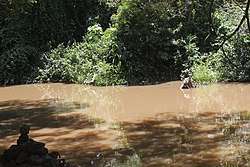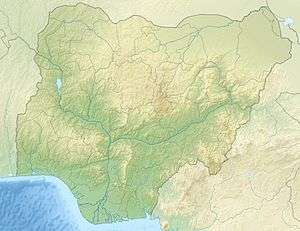Osun river
The Oṣun River (sometimes, but rarely spelt Oshun) is a river that flows southwards through central Yorubaland in southwestern Nigeria into the Lagos Lagoon and the Atlantic Gulf of Guinea. It is one of the several rivers ascribed in local mythology to have been women who turned into flowing waters after some traumatic event frightened or angered them.
| Oṣun River | |
|---|---|
 Osun River in Ekiti state-source of origin. | |
 | |
| Location | |
| Country | Nigeria |
| Region | Osun State |
| Physical characteristics | |
| Source | |
| • location | Ekiti state |
| • coordinates | 8°20′N 5°16′E |
| Mouth | |
• location | Lekki Lagoon |
• coordinates | 6.563210°N 4.062032°E |
| Basin features | |
| Tributaries | |
| • left | Erinle River, Oba River |
It is a sacred and reserved area where dirt and other unlawful activities are not meant to take place.
The river is named after the Oṣun or Oshun, one of the most popular and venerated Orishas.[1] The annual traditional worship at the Ọṣun Shrine near the Ọṣun River at Osogbo has become a popular pilgrimage and important tourist attraction, drawing people from all over Nigeria and abroad to the annual festival in August.
Osun is one of the river goddesses in Yorubaland, she is noted for providing for the needs of the people. She was reputedly one of the wives of Ṣango, the Yoruba god of thunder. The river goddess has been able to give the barren babies and change the lives of many people.[2] And also there has been many fictional stories about goddess oshun, for example, Shegun Coker and the cursed temple by Kolawole Michael, 2008.[3]
References
- Murrell, Nathaniel Samuel (2009). Afro-Caribbean Religions: An Introduction to Their Historical, Cultural, and Sacred Traditions. Temple University Press. ISBN 9781439901755.
- Katen Tate (2005). Sacred Places of Goddess: 108 Destinations. CCC Publishing. p. 132. ISBN 9781888729177.
- Joseph M. Murphy, Mei-Mei Sanford (2001). Osun across the Waters: A Yoruba Goddess in Africa and the Americas. Indiana University Press. p. 10. ISBN 9780253108630.